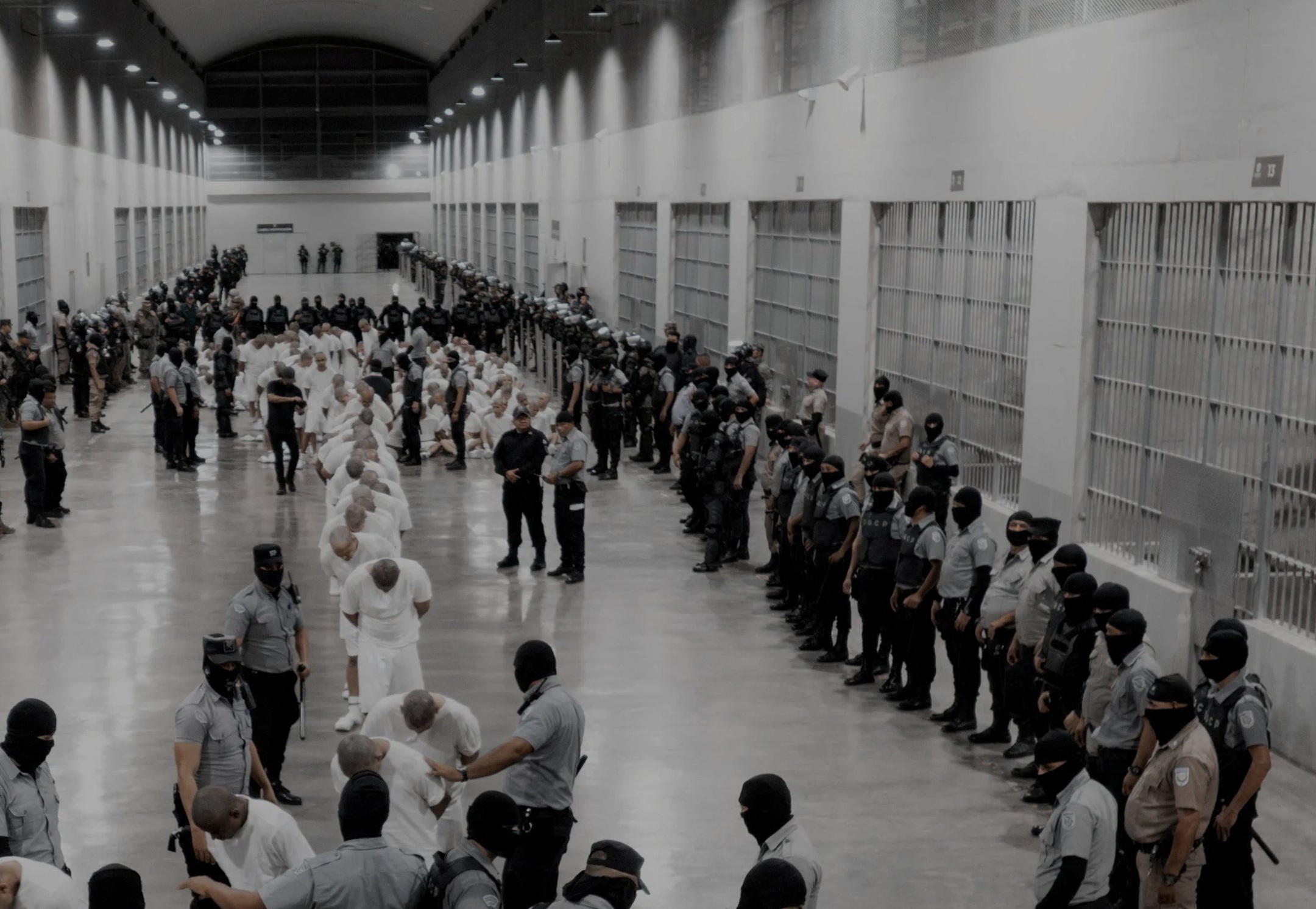Photo of police officers escorting Venezuelan migrants accused of gang-ties who were deported by the U.S. government prison, March in Tecoluca, El Salvador, March 16, 2025 from E.S. Presidential Press Secretary handout via the White House X (formerly known as twitter) account.
El Salvador: Three Years Under the State of Exception
Mass incarceration has expanded and democratic governance deteriorated in El Salvador since the state of exception began three years ago.
On March 27, 2022, at the request of President Nayib Bukele, the Legislative Assembly in El Salvador passed a state of exception, which limited constitutional guarantees and granted unrestricted powers to El Salvador’s security forces. Initially intended as a thirty-day measure, the state of exception has been renewed monthly by the legislative supermajority of President Bukele’s New Ideas party.
Currently, over 80,000 people are imprisoned in El Salvador, the highest prisoner rate in the world. Amnesty International and other civil society organizations noted in their January submission to the UN Human Rights Council that thousands of prisoners are held arbitrarily.
For years, El Salvador was known as the “murder capital of the world” given its high homicide rate that reached 106 per 100,000 inhabitants in 2015. Prior to Bukele, governments had negotiated ‘truces’ between the two major, perennially clashing gangs: MS13 — now designated as a terrorist group by the United States — and Barrio 18. However, these agreements yielded limited success.
Since the declaration of the state of exception, the overall homicide rate has fallen by more than 80 percent, as reported by the National Civil Police. The government of El Salvador is promoting its hardline anti-gang strategy as the “Bukele Model” to other countries in the region. However, serious human rights violations and a worrying democratic backsliding persist.
Under the state of exception, Bukele’s government suspended several constitutional guarantees related to due process. While the security situation has improved, democracy has deteriorated due to the absence of checks and balances and the lack of independence among the three branches of government.
Despite facing high rates of food insecurity, a potable water crisis, and the need to repair thousands of schools and invest in education, the government is increasing its security budget. This includes funding for the armed forces and for the construction of the new prison, the Centro de Confinamiento Contra el Terrorismo (CECOT), where Venezuelans were recently transferred by the U.S. government.
El Salvador has 25 detention centers. The CECOT has a capacity for 40,000 people, representing approximately 30 percent of the current prison population. The remainder are held in other facilities, such as the Mariona prison, where documented cases of torture and other human rights violations have occurred. The press and human rights organizations are denied access to these other centers.
Unlike the videos edited and produced about CECOT, the Inter-American Commission on Human Rights has stated that prisoners have been subjected to torture and other cruel and inhuman treatment. An estimated 350 people have died in state custody since the declaration of the state of exception.
On March 15, the Trump Administration sent a plane to El Salvador carrying Venezuelan and Salvadoran nationals accused of gang membership without due process. The Trump administration paid 6 million dollars to the Bukele government to house these people in the CECOT, allegedly for a year.
The international community, particularly human rights bodies within the United Nations and the Inter-American System, as well as multilateral organizations like the Organization of American States, need to urge the government of El Salvador to end the state of exception. Furthermore, a review of the humanitarian situation of detainees is crucial, and those without gang affiliations, minors, and vulnerable individuals such as women and the elderly should be released on humanitarian grounds. The president himself stated that innocent people have been detained.
Conversely, it is crucial to highlight that the state of exception has evolved beyond a security policy into an authoritarian instrument used to repress, persecute, and silence critical voices, as documented in cases like that of human rights defender Fidel Zavala, spokesperson for the Unidad de Defensa de Derechos Humanos y Comunitarios (UNIDEHC) who was arrested in February of this year.
A comprehensive reform of the prison and justice systems is overdue, particularly to provide judicial solutions for all those being prosecuted. Due to the vast number of cases, adequate criminal investigations are not being carried out and justice is not being served.
The United States should evaluate its security assistance. There are certain measures available, such as the Leahy Law which prohibits providing support to security agents or units involved in human rights violations. In the case of El Salvador, these kinds of violations have been sufficiently documented. Furthermore, the United States should support projects, from the government and civil society, that strengthen the justice system, improve criminal investigations, and prevent violence.

